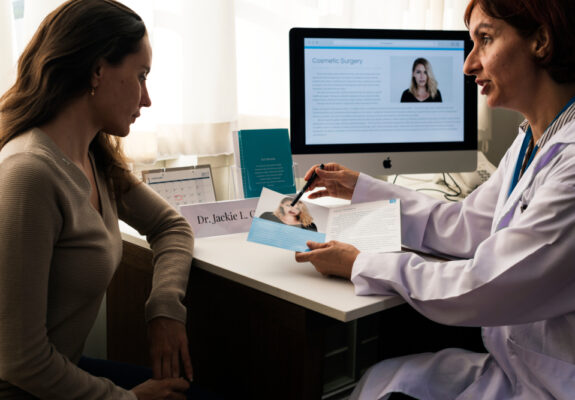Patients Turn to Google for Medical Advice Due to Long Delays and Fears of Misdiagnosis
With GP service satisfaction levels at an all-time low we analyse why patients may be feeling frustrated and are turning to Dr Google for Medical Advice.

It’s no secret that the NHS is under enormous pressure. In fact, recent reports have shown that there are currently 7.3m people waiting for NHS treatment in England – up by nearly 3m since the start of the Covid-19 pandemic – and one in 20 have been waiting more than a year.
And these extended waiting times are fuelling feelings of dissatisfaction, with the latest survey on NHS satisfaction showing that this fell to 29% – a 7% decrease from 2021, and the lowest level recorded since the survey began in 1983.
Satisfaction with GP services specifically fell to 35% in 2022, down from 38% in 2021. Again, this was the lowest level of satisfaction recorded since the survey began.
With this in mind, we’ve dug in deeper into some of the reasons why GP patients may be feeling frustrated, and also looked at what they’re doing to try and help themselves.
We’ve used data from a combination of sources including the NHS England appointment data dashboard, and a survey we ran in May 2023.
Overall, it’s clear that change is needed – and fast – and we are concerned that some of the methods proposed to help clear the backlog could in fact increase the risk of medical misdiagnosis amongst patients.
Read on to find out more.

The latest NHS satisfaction survey revealed that the main reason people feel frustrated is waiting times (69%), followed by staff shortages (55%). These are certainly not the only bugbears that Brits have with their local health services though.
We recently polled 1,000 UK-based patients who had seen their GP in the last six month about their experience, to find out more.
Overall, over one in six (16%) told us they were left feeling dissatisfied by their appointment.
Those with a suspected endocrinology (menopause, thyroid) condition were the most likely to feel dissatisfied (32%), alongside those with suspected Long Covid (25%).
Patients aged 18-24s were the most likely to say they were dissatisfied (30%) while over 65s were the least likely to say this (8%).
We found that the most common reason for dissatisfaction was that many (48%) didn’t feel their health concern or symptoms were taken seriously.
Those with suspected kidney (80%), gynaecology (73%) or endocrinology i.e., menopause or thyroid (75%) conditions / issues were the most likely to feel this way.
Nearly half (45%) also said they didn’t feel the GP took the time to understand their health concern or symptoms properly, with men (49%) and over 65s (54%) citing this in higher numbers.
Over three in ten (31%) patients also said they didn’t receive the outcome they wanted from their appointment i.e., a referral or treatment, with 18-24s the most likely to say this (50%).

Over two thirds (69%) of those waiting for a diagnosis or treatment (following a referral by their GP) told us that they’ve Googled their condition or symptoms at least once.
Women were more likely to have done this than men (73% versus 66%), with those aged between 25-44 (Millennials) the most likely to have done this (79%).
Asking Dr Google for advice was also more common among those with suspected kidney (88%), gynaecology (81%) or dermatology (78%) – skin conditions.
Of those who have done this, the main reason (49%) was to get some ‘reassurance’ – and men are more likely to do it for this reason than women (51% versus 48%).
Four in ten (40%) also wanted to know if there was anything they could do to help themself while waiting – women are more likely to do it for this reason than men (43% versus 36%).
Nearly a quarter (22%) said they turned to Google for advice because they felt ‘powerless’, with patients with suspected Long Covid the most likely to feel this way (58%).
Worryingly, one in ten (10%) Googled their symptoms because they didn’t think they’d received the right diagnosis from their GP, and it was 18-24s who were the most likely to feel this way (29%).

There were nearly two million more GP appointments this March (31.4 million) than last March (29.6 million) – so it is perhaps no surprise that some patients will be waiting longer as demand on services rises.
While the number of appointments peaked at 31.89 million in December, March was the second highest month since October 2020.
A worrying 4% of patients are therefore left waiting over four weeks (28 days) for an appointment with their doctor, and while this peaked at 6% in October last year, it has averaged at 3.4% since October 2020.
Monday and Tuesday are the busiest for appointments – around 19% happen on Mondays and around 18% on Tuesdays.
Patients are least likely to be seen on the same day if they try to get an appointment on a Saturday (14%), and most likely to be seen on the same day if they try to get an appointment on a Monday (49%).
We already know that waiting times can be long, but there seems there is somewhat of a postcode lottery system in place too.
Patients are most likely to be seen on the same day in…
- Lancashire and South Cumbria (52%)
- Cheshire and Merseyside (52%)
- Humber and North Yorkshire (51%)
- Coventry and Warwickshire (51%)
- Birmingham and Solihull (49%)
Patients are most likely to face a wait of over four weeks in…
- South Yorkshire (8%)
- Gloucestershire (8%)
- Derby and Derbyshire (8%)
- North East and North Cumbria (7%)
- Sussex (7%)

Over one in five (21%) of recent GP patients we polled felt the mode of their appointment (i.e., telephone) was not appropriate for their condition or symptoms, so we dug into NHS data to see how many of these are still not happening face-to-face.
Interestingly, quite a high proportion – around 70% of appointments – are occurring face to face – up from 62% in March 2022 and 54% in March 2021.
This figure has been slowly increasing month-on-month since November too, although it peaked at 71% in October last year.
Patients are most likely to be seen face to face in…
- Mid and South Essex (84%)
- West Yorkshire (84%)
- North East and North Cumbria (82%)
- Mid and South Essex (81%)
- Staffordshire and Stoke-on-Trent (81%)
Face to face appointments are also most common on Saturdays (around 79%), and least common on Mondays (69%).
Patients are most likely to have a video or telephone appointment in…
- Buckinghamshire, Oxfordshire and Berkshire West (40%)
- Frimley in Surrey (40%)
- Cheshire and Merseyside (40%)
- South East London (36%)
- Herefordshire and Worcestershire (35%)
It’s great to see that more patients are seeing their GP in person, as this should in theory reduce the risk of incorrect diagnosis as certain checks can be made more easily.
What is worrying though is that many appointments are very short. In fact, March data showed that 16% of appointments lasted five minutes or less, and 35% lasted for 10 minutes or less.
Again, the likelihood of having a very brief appointment varies by location, with one in five patients in some areas getting very little face (or phone) time to discuss their health concerns.
Patients are most likely to have an appointment that lasts five minutes or less in…
- Suffolk and North East Essex (20%)
- Humber and North Yorkshire (20%)
- West Yorkshire (20%)
- Leicester, Leicestershire and Rutland (19%)
- Lincolnshire (19%)
- Nottingham and Nottinghamshire (19%)
- Gloucestershire (19%)
- Hampshire and the Isle of Wight (19%)
- North East and North Cumbria (19%)
- Mid and South Essex (19%)

Recently (9 May), the prime minister unveiled plans to “transform” primary care by giving pharmacists in England the power to write prescriptions for some common conditions including earache, sore throat, urinary tract infections, infected insect bites, impetigo, shingles and sinusitis without needing the approval of a GP.
The measure could be rolled out across England as soon as this winter.
Self-referrals are also set to be increased for services including physiotherapy, hearing tests and podiatry, bypassing the need to see a GP.
While NHS chief executive Amanda Pritchard said the reforms would “help to free up millions of appointments for those who need them most”, we are concerned that this shortcut could mean that some people do not receive the care or treatment they need, and receive a delay in diagnosis or a mis-diagnosis of their condition.

Across the NHS there are numerous guidelines in place to help medical professionals offer the right care, and often that means sending a patient to see a specialist for further tests or a particular treatment.
Between w/c 30/12/2019 and w/c 24/04/2023, there were a total of 54,168,868 referrals made by GPs, and of those, 17,911,770 (33%) were ‘2 Week Wait’ and ‘Urgent’ referrals.
So far, the number of referrals remains stable in 2023, but with the number of GP appointments being higher this could indicate that a smaller percentage of patients are being passed on to a specialist for additional assessment. This could in turn lead to patient frustrations, and potentially delayed or incorrect diagnosis.
Our survey data revealed that the conditions that people are most likely to have gone to their doctor about in the last six months were relating to their skin (15%), back/knee or hip pain (12%), a cold/flu (12%), diabetes (9%) or to discuss physiotherapy (6%).
With this in mind, we wanted to share some of the NICE guidelines on referrals for these conditions, so patients can better-understand in what situation they may be referred to a specialist.
Diabetes
GPs are advised to…
- Refer children and young people with suspected type 1 diabetes immediately (on the same day) to a multidisciplinary paediatric diabetes team with the competencies needed to confirm diagnosis and provide immediate care.
- When adults are diagnosed with type 1 or 2 diabetes, refer them immediately to the local eye screening service.
Dermatology (skin)
GPs are advised to…
- Refer people with secondary bacterial infection of eczema to hospital if they have any symptoms or signs suggesting a more serious illness or condition, such as necrotising fasciitis or sepsis.
- Consider referral or seeking specialist advice for people with secondary bacterial infection of eczema if they:
- have spreading infection that is not responding to oral antibiotics
- are systemically unwell
- are at high risk of complications
- have infections that recur frequently.
- Refer people using a suspected cancer pathway referral (for an appointment within 2 weeks) if dermoscopy suggests melanoma of the skin.
Thyroid
There are currently no standardised diagnostic or referral criteria in the UK to guide decision making in primary care for people with structural thyroid abnormalities or enlargement.
Menopause
GPs are advised to…
- Refer women to a healthcare professional with expertise in menopause if treatments do not improve their menopausal symptoms or they have ongoing troublesome side effects.
- Consider referring women to a healthcare professional with expertise in menopause if:
- they have menopausal symptoms and contraindications to HRT or
- there is uncertainty about the most suitable treatment options for their menopausal symptoms.
Long Covid
GPs are advised to…
- Offer tests and investigations tailored to people’s signs and symptoms to rule out acute or life‑threatening complications and find out if symptoms are likely to be caused by ongoing symptomatic COVID‑19, post‑COVID‑19 syndrome or could be a new, unrelated diagnosis.
- Refer people with ongoing symptomatic COVID-19 or suspected post-COVID-19 syndrome urgently to the relevant acute services if they have signs or symptoms that could be caused by an acute or life‑threatening complication.
Back Pain
GPs are advised to…
- Consider referral for assessment for radiofrequency denervation for people with chronic low back pain when:
- non-surgical treatment has not worked for them and
- the main source of pain is thought to come from structures supplied by the medial branch nerve and
- they have moderate or severe levels of localised back pain (rated as 5 or more on a visual analogue scale, or equivalent) at the time of referral.
Although they are also advised that most back pain episodes get better with initial primary care management, without the need for investigations or referral to specialist services.
Knee Pain
GPs are advised to…
- Refer people who develop new or worsening pain, limp or loss of function related to their joint replacement to an orthopaedic surgical service.
Our conclusion
Neil Crossley, Head of Medical Negligence (Bolton) said; “It’s clear that the NHS is under enormous and ever-growing pressure, and that change is needed. However, our view is that funding should be implemented to support GPs, employ new GPs and employ support staff. The changes being rolled out by the Government are likely to heighten the risk of a delayed diagnosis and/or an incorrect diagnosis being made. This in turn leads to patients and the primary care system suffering.
GPs are often put in a situation whereby their ability to adequately understand a patient’s concerns and appropriately determine the right next step is being compromised – and that does not seem fair on them, or their patients.
As part of our study, we were particularly interested to see how many young people (aged under 35) felt that their GP was not taking their health concerns seriously or listening to them. The stakes are even higher here, as young people who are misdiagnosed or have a delayed diagnosis can be left dealing with long-term health issues, which can cause loss of income amongst other life-changing affects.”
We’re here to help
If you think that your GP practice has failed in their duty of care to you and you’ve suffered as a consequence, then you may want to explore a medical negligence claim.
Examples of medical negligence are widespread and still occur across the country, and substandard care should not simply be accepted.
We appreciate that putting in a claim can feel daunting, so we are here to help and support you every step of the way.
Please call us on 0800 234 3234 or contact us and a member of our legal team will call you back.
Our sources and methodology
Survey insight
- A survey was run with 1,000 UK adults who have seen their GP / a GP in the last six months, in May 2023
- Data was split by respondent age, gender, condition, and region
NHS (National Health Service) data
- https://digital.nhs.uk/data-and-information/publications/statistical/appointments-in-general-practice/march-2023 – appointments data, from w/c 30/12/2019 up to w/c 24/04 2023 (England only).
- https://digital.nhs.uk/dashboards/ers-open-data – NHS e-Referrals data up to 20th March 2023. Under the NHS Standard Contract, all GPs in England use e-RS to make all referrals to consultant-led outpatient services.
- https://www.england.nhs.uk/statistics/wp-content/uploads/sites/2/2023/04/MRR-SPN-February-23-QRCNG.pdf – NHS Outpatient Referrals, February 2023.
Supporting insight
- Every visit to your GP is meant to follow The National Institute for Clinical Excellence’s guidelines. These are updated regularly and are designed to help GPs offer treatment and, where necessary, refer patients https://www.nice.org.uk/guidance/published?type=apg,csg,cg,mpg,ph,sg,sc .
- Public satisfaction with the NHS https://www.kingsfund.org.uk/publications/public-satisfaction-nhs-and-social-care-2022 (published 23rd May 2023). The National Centre for Social Research’s (NatCen’s) British Social Attitudes (BSA) survey has been conducted annually since 1983. The most recent survey was carried out between 7 September and 30 October 2022 and asked a nationally representative sample (across England, Scotland and Wales) of 3,362 people about their satisfaction with the National Health Service (NHS) and social care services overall, and 1,187 people about their satisfaction with specific NHS services, as well as their views on NHS funding.
- Recent government announcement about conditions that pharmacies will be able to treat without a GP diagnosis / prescription https://news.sky.com/story/pharmacies-given-new-power-to-prescribe-medication-under-plans-to-free-up-gp-appointments-12876410.
